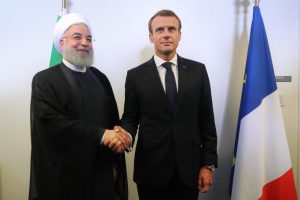by John Feffer
In his new film Taxi, Iranian director Jafar Panahi is having a conversation with his young niece.
They’re sitting in the cab Panahi is driving. The Iranian government has banned the director from making films, so he’s ostensibly found an alternative means of making money and of making films. He’s set up a camera on the dashboard, and this camera captures all the conversations he conducts in the taxi. It’s a form of cinéma vérité, though as the film progresses these interactions begin to appear as staged as any American-style mockumentary.
Panahi’s niece, Hana Saeidi, is making her own film as part of a class project. The teacher has given her a list of dos and don’ts. Perhaps the most challenging prohibition is to avoid anything that smacks of “sordid realism.” Panahi listens bemused as his niece recites these restrictions. After all, his earlier films — The Circle, Crimson Gold, Offside — were supreme examples of “sordid realism” in their depiction of some of the less savory aspects of Iranian society. As a result of this work, Panahi was arrested in 2010 and banned from making films for 20 years.
Taxi itself, with its depiction of the aftermath of a motorcycle accident and the black-market trade in DVDs and the activities of a human rights lawyer, would also fall into the Iranian government’s category of sordid realism. Panahi doesn’t barbecue sacred cows the way Pussy Riot does, but he definitely skirts the edge of the acceptable. Fellow director Kaiwan Karimi just recently received a six-year sentence and 223 lashes for his own filmmaking transgressions, which included a planned kissing scene in an upcoming movie. Sordid, indeed! At least Panahi is free at the moment to make his non-films and smuggle them out of the country.
Taxi opened in the United States just a couple days before the official adoption of the international agreement on Iran’s nuclear program. It was an interesting coincidence. Americans could get a closer look at Iran, warts and all, as we take a first important step toward a détente with a country we’ve demonized for years.
In part to celebrate adoption day, Secretary of State John Kerry gave a speech at Indiana University praising the agreement as the most effective method of restraining Iran’s nuclear ambitions. His comments on the agreement were reasonable:
This agreement came together as a result of tough diplomacy that extended over two presidencies, and we began with sanctions, but sanctions were a means, not an end. Only by direct negotiations with support from a broad array of partners — including Russia and China, by the way — were we able to convince Iran’s top officials to accept the severe limits on their nuclear program. And we are moving now to the implementation stage, and it is essential that we will maintain our vigilance, our unity of approach, and our common purpose.
Kerry didn’t mention some of the thorns in the U.S.-Iranian relationship — the recent Iranian conviction of Washington Post journalist Jason Rezaian, the various congressional efforts to derail the agreement by slapping on new sanctions against Iran. But that’s the prerogative of government officials. They’re not intellectuals, nor are they artists. They try to steer clear of sordid realism when describing their own efforts.
But Kerry went further. He also used the Iran deal as Exhibit A to counter the prevailing American perception that the world is breaking apart like Humpty Dumpty. “I don’t sense an unraveling of the global fabric,” Kerry told his audience. “I see a world that in critical areas is actually increasingly coming together.”
The nuclear deal and Kerry’s optimism notwithstanding, the world does not currently seem to be celebrating a Kumbaya moment. There’s the rise of the Islamic State, the civil wars in Syria and Ukraine, and the breakdown of order in Afghanistan, Iraq, and Libya. The refugee crisis is engulfing the Middle East and Europe. The Chinese economy is hitting a rough patch, which has a negative impact on the global economy. Global warming continues largely unabated.
Then there’s what’s going on right now in Israel and Palestine. In his speech Kerry acknowledged the recent violence but failed to provide any context. Like most American officials, he tends to ignore the sordid realities of Palestinian life. My recommendation: Stick Kerry and all of Congress into taxis and send them through the West Bank or Gaza. They’d discover a reality more depressing than virtually anything Jafar Panahi encounters on the streets of Tehran. Iran, for all its faults, is a sovereign state while Palestine is….what exactly?
Occupations and Preoccupations
It’s always difficult to pinpoint the exact starting point of a cycle of violence.
At the beginning of October, Palestinian gunmen killed an Israeli couple, Eitam and Naama Henkin, as they returned to their home in the Occupied Territories. Shortly thereafter, a 19-year-old Palestinian with a knife attacked and killed Aharon Bennett and Nehemia Lavi in Jerusalem. A series of attacks on Israeli citizens and uniformed personnel followed. The uprising has been labeled on social media the “Jerusalem intifada” or the “intifada of the knives.” Ten Israelis have been killed in the recent spate of violence. And 44 Palestinians, including the assailants, have died in clashes with Israeli authorities.
The proximate cause of this violence has been access to religious sites in Jerusalem. Nothing symbolizes the contested claims to territory more than the Dome of the Rock and the al-Aqsa Mosque, which share space in the Temple Mount/al-Haram al-Sharif complex in the Old City. In September, Palestinians staged protests over Israeli government restrictions on visitors to al-Aqsa, the third most revered site for Muslims after Mecca and Medina. In response to the initial killings, the Israeli government upgraded its security measures, deploying soldiers to Israeli cities for the first time in more than 10 years and banning men under 45 from attending the al-Aqsa Mosque on Fridays.
The larger issue, of course, is the disposition of Israeli settlements.
In East Jerusalem alone, 200,000 Israeli settlers have taken up residence in clear violation of international agreements. The Israeli government continues to support construction of settlements in other parts of the Occupied Territories, which house nearly 300,000 more settlers. The footprint turns out to be much bigger than these numbers would suggest. “Settlements are built on less than 3 percent of the area of the West Bank,” according to the Council of European Palestinian Relations. “However, due to the extensive network of settler roads and restrictions on Palestinians accessing their own land, Israeli settlements dominate more than 40 percent of the West Bank.” In addition, the Israeli government has maintained a tight blockade of the Gaza strip since 2007.
The Obama administration has condemned these settlements as “illegitimate.” But the administration has failed to use any of the considerable levers at its disposal to pressure Israel to roll back the settlements. Indeed, as Emile Nakhleh points out in LobeLog, the United States has largely ignored the anger and frustration building up among Palestinians. “American leaders have been lulled into believing that the Palestine issue is a thing of the past and that preponderant Israeli military power in the Occupied Territories has rendered Palestinians quiescent and complacent,” he writes. “So much so that when President Obama gave his annual talk to the UN General Assembly this fall, ‘Palestine’ was nowhere to be found in his speech.”
It’s easy to understand why Obama and Kerry prefer to focus on the Iran agreement or, in an effort to dispel congressional charges of fecklessness, U.S. efforts to degrade the Islamic State. And the Netanyahu government is really in no mood for compromise. As for the Palestinians, they’re hard-pressed to come up with a unified position on dealing with Israel.
The stand-off in the Holy Land is the very definition of a wicked problem: “a social or cultural problem that is difficult or impossible to solve for as many as four reasons: incomplete or contradictory knowledge, the number of people and opinions involved, the large economic burden, and the interconnected nature of these problems with other problems.” For many years, a two-state solution has been the default response to this wicked problem. But the spread of settlements, the disagreements over the status of Jerusalem, and the right of return for Palestinian refugees have all made a two-state solution a very unwieldy enterprise.
Two decades ago, after a Jewish extremist assassinated Prime Minister Yitzhak Rabin, Israel could have worked out a compromise with Palestinian leaders that might have prevented this problem from becoming as wicked as it is. But as Dan Ephron points out in a new book, Shimon Peres blew the opportunity by choosing instead to track down and kill Palestinian militant Yahya Ayyash. In the cycle of violence that ensued, Peres lost at the polls, and Israelis got their first taste of Benjamin Netanyahu. Israeli government policies have been sordid realism ever since.
The Real Two-State Solution
While diplomats scramble to breathe life into the moribund peace process, the two sides are pushing their own de facto two-state solutions. Israeli settlers are simply seizing territory and relying on the infrastructure of Israeli power to integrate those patches of land into Israel proper. It’s like an ugly reclamation project where new communities spring up on what was once not water but someone else’s land.
The Palestinian Authority, headed up by Mahmoud Abbas, has meanwhile tried to create a de facto Palestinian state on the territory of international law. Abbas recently declared the era of Oslo — the peace architecture created in 1993 and updated in 1995 — dead and gone. Even as his own domestic support slips away from beneath him, Abbas is constructing a simulacrum of sovereignty. After achieving non-member status at the UN in 2012, he’s pressed for Palestinian membership in as many international bodies as possible, including the International Criminal Court. In September, the Palestinian flag flew for the first time outside the UN headquarters in New York.
Israel expands its state parcel by parcel while Palestine creates its state meeting by meeting.
This reality of state creation from below versus state creation from above — as opposed to a consensual process from both above and below — has soured many on the international community’s fallback option. A slim majority of Palestinians, according to a poll by the Palestinian Center for Policy and Survey Research, now oppose the two-state solution. An even more telling sign of sordid realism, 78 percent of Palestinians think that it’s next to impossible that they’ll get their own state in the next five years. Support among Israelis for the two-state solution is also falling.
The French have bravely waded into these troubled waters. They proposed over the summer to expand the negotiating table to include such countries as Saudi Arabia and Ireland. The proposals that came out of the first meeting of this 24-member body were not particularly startling — maintain access to religious sites in Jerusalem, freeze settlements, prepare for bringing a Palestinian statehood resolution to the UN. But perhaps France can achieve what the United States, hardly a neutral party in the conflict, has failed to accomplish.
Netanyahu, however, doesn’t feel compelled to deal. But here’s what ultimately might push Israel to the table — more than knives or the Boycott Divest Sanctions movement or Palestinian lobbying at the UN or French efforts to internationalize (once again) this wickedest of all problems.
In the United States, Israel has lost the support of the Democratic Party — not the majority of the lawmakers in Congress, but voters who identify with the party. According to a poll from the Chicago Council on Global Affairs from the end of August, only 41 percent of Democrats (compared to 61 percent of Republicans) believe that Israel has “played a somewhat or very positive role in resolving problems in the Middle East.” A commanding majority of Democrats (61 percent) support an independent Palestinian state (a slim plurality of Republicans also support such a plan).
Netanyahu is no doubt betting on Hillary, who has moved to the left on many issues to court liberal voters but not on Israel. But he should be very worried about the shift in the U.S. electorate. Such public opinion shifts have, over time, prepared the way for the détente with Cuba and the nuclear deal with Iran. It’s just a matter of time before the leadership catches up with their constituents.
Check out what’s already happening elsewhere in North America. The Israeli prime minister just lost a key ally when Stephen Harper went down to defeat in the recent Canadian elections. Netanyahu may wake up one day to the sordid reality that Israel commands as much authority in the international community as North Korea.
Republished from Foreign Policy In Focus. Photo by Jordi Bernabeu Farrús via Flickr.






“Taxi” is a heavy handed, badly played and predictable anti-Iran propaganda that was made to guarantee its success in the West. As a film it is worthless.
“Wicked problem,” eh? Interesting euphemism for the consequences of permitting an occupying country to violate any international law, agreement, treaty, and/or human right with impunity whenever convenient. Washington has always had the power to put an end to this travesty but it is too addicted to right-wing Jewish money and too much in denial about that addiction. Washington prefers the transparent pretense that there is some kind of moral equivalence between what Israel wants and what Palestinians are expected to keep giving,